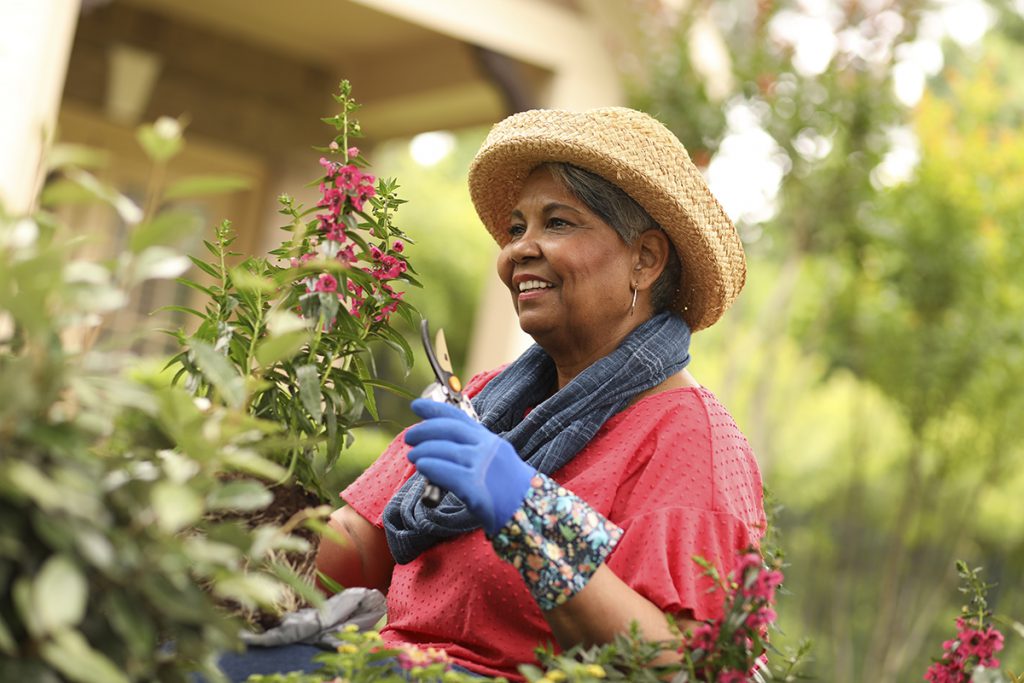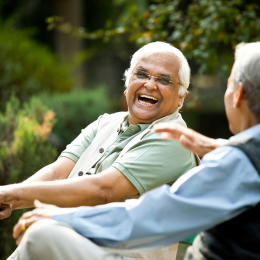6 Surprising Health Benefits of Gardening
Gardening is all about caring for plants. But it turns out that when you garden, you’re also caring for your own physical and mental wellbeing.

“Gardening promotes overall health and quality of life, physical strength, fitness and flexibility, cognitive ability, and socialization,” says Jean Larson, Ph.D., the Nature-Based Therapeutics Faculty Lead at the University of Minnesota’s Earl E. Bakken Center for Spirituality & Healing and the Minnesota Landscape Arboretum.
Don’t be afraid to dig in and get your hands dirty. Here are all the ways your green thumb is good for your health.
Add SilverSneakers to your wellness routine! Classes and events are happening daily at participating gyms, online through SilverSneakers LIVE, and at community centers near you. Activate your free online account to get started.
Gardening Counts as Exercise
An afternoon pulling weeds, spreading mulch, or planting flowers feels like exercise — and that’s because it is.
Gardening is considered moderate-intensity exercise, according to the Centers for Disease Control and Prevention (CDC). The CDC recommends 150 minutes of moderate-intensity exercise per week. A couple of mornings tending your garden will easily get you on your way toward that goal.
Recommended reading: 5 Tips to Turn Yardwork Into a Total-Body Workout
Gardening Boosts Your Memory
“There’s some research to show that time spent in green spaces working in gardens can help those with memory loss, specifically by lessening their symptoms of depression and anxiety,” says ecologist Joshua Lawler, Ph.D., professor and director of the Nature and Health Program at the University of Washington.
Lawler points to Maude’s Garden, a memory garden for people living with dementia created by the university’s Memory and Brain Wellness Center, as an example of this in action.
One review in 2021 in the International Journal of Environmental Research and Public Health concluded that therapeutic gardening improved wellbeing in people with dementia.
And gardening can boost your brain power beyond dementia care. Research in 2019, also in the International Journal of Environmental Research and Public Health, found that a 20-minute gardening session for healthy adults over age 65 improved levels of certain brain nerve growth factors associated with memory and cognitive function.
Gardening Can Help Improve Your Diet
When you get into gardening, you get to enjoy the (literal) fruits of your labor. Taking home your bounty and eating more fruits and vegetables can help improve your diet.
Adults should aim to eat 1.5 to 2 cups of fruit and 2 to 3 cups of vegetables every day, according to the CDC.
Whether you follow a plant-based diet or serve up a side of leafy greens with chicken for dinner, food always seems to taste better when you grow it yourself.
Gardening Lets You Soak up the Sun
When your skin is exposed to sunlight, your body makes more vitamin D. This crucial vitamin helps support nerve, muscle, and immune health.
Vitamin D is all the more important as we age. Having a vitamin D deficiency can lead to bone diseases such as osteoporosis.
Plus, sunlight can help lower your blood pressure, according to a 2018 report in Clinical Medicine. (Just don’t forget to wear sunscreen.
Recommended reading: Vitamin D: Are You Getting Enough of This Key Nutrient?
Community Gardening Serves up Social Connection
Community gardens have garden plots full of vegetables, fruits, and flowers that are maintained by dedicated members of the community (like you). If you rent one of these small plots, you can grow some fresh produce, even if you don’t have a yard at your home.
But that’s not all: “Community gardens provide a social aspect. People are always chatting, and they might even get together and have parties,” says Kathleen Wolf, Ph.D., a retired research social scientist with the University of Washington.
You just may meet new friends at your town’s community garden. And gardening with friends can counteract the harmful effects of social isolation, especially on those with poor mental health, according to a 2018 Clinical Medicine review.
Subscribe to our newsletter
It's quick and easy. You could be one of the 13 million people who are eligible.
Already a member? Click to discover our 15,000+ participating locations.
Follow Us
Gardening Relieves Stress
Yes, gardening is good for you. But the main reason people garden? It feels good, according to a 2021 Cities study.
Researchers looked at more than 5,000 gardeners in the United Kingdom. Two or three gardening sessions per week were found to bring about the most benefits in terms of improved wellness and lower stress.
It turns out working in a garden for enjoyment is a highly restorative activity, according to a 2020 Landscape and Urban Planning study.
If you’re brand new to gardening, there are a few easy-to-grow starter vegetable plants for your garden, according to the Farmer’s Almanac:
- Lettuce
- Peas
- Radishes
- Beets
- Summer squash
Remember, you don’t have to jump into something big. “I suggest you start with a container of herbs and see how that success can propel you to more,” says Larson. Happy planting.
See our sources
- Physical activity intensity guidelines: Centers for Disease Control and Prevention
- Effects of gardening on dementia patients: International Journal of Environmental Research and Public Health
- How gardening affects cognition: International Journal of Environmental Research and Public Health
- How much fruit and vegetables adults should eat: Centers for Disease Control and Prevention
- Vitamin D overview: MedlinePlus
- Study on health benefits of gardening: Clinical Medicine
- Link between gardening and stress: Cities
- Why gardening makes us feel good: Landscape and Urban Planning
- Easy vegetables to grow at home: Farmer’s Almanac
Check Your SilverSneakers Eligibility Instantly
SilverSneakers members can go to thousands of gyms and fitness locations across the nation, plus take SilverSneakers LIVE online classes that are designed for seniors of all levels. If you have a Medicare plan, it may include SilverSneakers—at no additional cost. Check your eligibility instantly here.
Already a member? Get your SilverSneakers member ID and exclusive fitness content by activating your online account here.
Not eligible for SilverSneakers? You can still get 200+ free SilverSneakers On-Demand videos and stay in touch with us by creating your online account.




